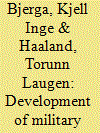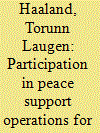|
|
|
Sort Order |
|
|
|
Items / Page
|
|
|
|
|
|
|
| Srl | Item |
| 1 |
ID:
098451


|
|
|
|
|
| Publication |
2010.
|
| Summary/Abstract |
In this article, the development of the Norwegian Armed Forces' Joint Doctrine of 2007 is analysed in order to illustrate some distinct characteristics of the development of small state doctrines. First, small states have limited freedom and limited institutional capacity to realise their own ideas about the use of their military forces. Furthermore, their contribution of forces to multilateral military operations signals political support for an institution (NATO) or a cause, but they are too small to make a real difference to the military operation. Hence, the operational experiences of these forces differ from those of larger countries. The stakes are lower, and they are unlikely to suffer military defeat in a decisive way. They may suffer losses, but they will not lose a war. As a consequence, small state doctrines at the strategic level have become detached from the question of operational effectiveness and are instead utilised for the purpose of promoting political, legal and ethical messages to the military, to a domestic audience, and to international allies.
|
|
|
|
|
|
|
|
|
|
|
|
|
|
|
|
| 2 |
ID:
149018


|
|
|
|
|
| Summary/Abstract |
This article – based on interviews with Norwegian Provincial Reconstruction Team (PRT) commanders and the lessons-learned database of the Norwegian Armed Forces – argues that what appear to be an inability or unwillingness to learn and adapt in war may have other explanations. The ambiguity of experiences makes lessons contested, contradictory, and fluid interpretations of confusing events. Consequently, they do not provide unequivocal guidance for adaptation. Even when lessons learned are fairly clear and agreed upon, adaptation does not automatically follow, as force autonomy may be quite limited, at least for small states in coalition operations conducted in partnership with indigenous forces.
|
|
|
|
|
|
|
|
|
|
|
|
|
|
|
|
| 3 |
ID:
079097


|
|
|
|
|
| Publication |
2007.
|
| Summary/Abstract |
Norway's growing participation in international missions has challenged both civilian and military perceptions of the ideal role of the Norwegian military. The armed forces' overall purpose has gone from homeland defence to being a security policy instrument. At the same time, the traditional humanitarian profile of Norway's foreign deployments has been replaced by a more distinct military role. Although politically initiated, the restructuring of the Norwegian armed forces has political implications that may be difficult to accept. A defence structure adapted to high-intensity operations abroad entails new political choices, but for small countries, such as Norway, political choices are also constricted as a result of closer integration with multinational force structures. Furthermore, a much smaller structure combined with high international ambitions places a heavy strain on military personnel and their families. Thus far, political and military leaders in Norway have largely agreed on the overall direction of military reforms. However, military authorities have signalled that ample budgets are required, along with further geographical concentration of forces in Norway and a continued commitment to international force integration. All these measures come at a high political cost
|
|
|
|
|
|
|
|
|
|
|
|
|
|
|
|
| 4 |
ID:
100023


|
|
|
|
|
| Publication |
2010.
|
| Summary/Abstract |
This article analyses a cultural transformation taking place in Norwegian units deployed abroad as the framework for these operations shifted from UN to NATO command in the mid-1990s. In UN operations during and shortly after the Cold War, there was a cultural gap between the military at home and the units deployed abroad, and experiences from overseas operations were perceived as without relevance for national defence. After NATO became the preferred framework for Norwegian deployments, national military culture, which focused primarily on war-fighting skills and discipline, replaced the UN culture's focus on non-combat skills and practical problem-solving. This transformation had an impact on the Norwegian units' interaction with local cultures in the deployment area. But, since the identity of individual service members remained primarily linked to Norway and the Norwegian armed forces, the changes were of a practical rather than an ideological or motivational nature.
|
|
|
|
|
|
|
|
|
|
|
|
|
|
|
|
|
|
|
|
|